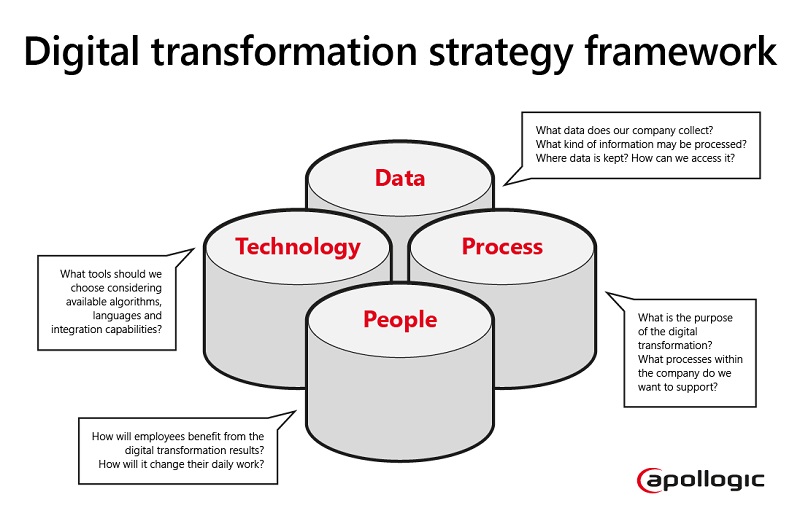Data analytics and artificial intelligence as integral parts of digital transformation

Tomasz Radomski, VP Apollogic, Digital Transformation Advisor
- 16th September 2021
- Knowledge base
- 5 min

Digital transformation is one of the critical factors for staying competitive in the constantly evolving business environment. According to forecasts, edge and quantum computing, robotic process automation, Internet of Things, blockchain, and mixed and augmented reality will completely dominate the new technology market in the coming years. Still, artificial intelligence, machine learning, and data analytics will play a key role in transforming today’s businesses.
1. How can enterprises benefit from artificial intelligence and data analytics?
2. How can data analytics and artificial intelligence help decision-makers better understand the vast amount of data?
3. How does artificial intelligence fit into a digital transformation project?
4. What steps should companies begin with when it comes to a digital transformation project?
5. Are artificial intelligence and data analytics still a choice, or are they becoming necessary as part of digital transformation?
How can enterprises benefit from artificial intelligence and data analytics?
Leveraging the power of artificial intelligence, machine learning and data analytics can become a foundation for innovation and a source of competitive advantage. More importantly, to fully benefit from the potential of these technologies, some companies are choosing to invest in expanding their data analytics teams. In order to understand the opportunities and the range of applications that the dynamic development of these technologies brings, it’s necessary to introduce some important concepts at the very beginning.
Data science combines statistics, data analysis, and machine learning that involves collecting, processing, and analyzing structured and unstructured data to gain insights from it and turn them into meaningful conclusions.
Data analytics is a process that uses statistical and mathematical methods to transform raw data into information for better business decisions.
Artificial intelligence is a field that allows you to answer questions that traditional analytics cannot answer. AI-based technologies, such as machine learning, deep learning, and natural language processing, mimic or simulate cognitive behaviors and successively improve their operations with the data they acquire.
Data mining is a complex analytical process of discovering correlations, schemes, and hidden patterns within large data sets.
How can data analytics and artificial intelligence help decision-makers better understand the vast amount of data?
AI-related topics have long ceased to be associated with the futuristic world known from popular science fiction movies and have become an integral part of digital strategy, which is successfully implemented by Innovation & Development Directors. The value of collected data can bring many benefits to an organization, but only if it becomes possible to interpret it to make more effective decisions and plan future actions.
Maintaining competitiveness will be determined by well-thought-out use of available data and implementation of digital tools that will enable the unification of resources lying in databases, data warehouses, and data lakes – systems that allow storing large unstructured data sets. Companies that analyze collected information by using solutions supported by artificial intelligence algorithms not only achieve higher financial results but also better understand current customer needs and, what’s more, can predict their future behavior using deep learning for pattern recognition.
How does artificial intelligence fit into a digital transformation project?
As a catalyst for digital transformation, artificial intelligence supports organizations in becoming more adaptive, flexible, and innovative. Companies that implement solutions using AI algorithms more effectively attract new customers (by defining so-called personas – personal profiles that can be used to segment customers and create marketing strategies corresponding to predefined personas), reduce risk (by determining the probability of a certain scenario) and improve customer service (by reducing response time to the most common questions with support of AI-powered assistants). These are just some of the many examples of how artificial intelligence can be used to optimize processes. Machine learning may significantly reduce the average time spent on time-consuming, repetitive activities while minimizing the chance of human-induced failures. Predictive analytics and real-time segmentation can help plan marketing campaigns more effectively, preventing inefficient use of advertising budgets.
What steps should companies begin with when it comes to a digital transformation project?
At the very beginning of cooperation with a technology partner, it’s recommended to diagnose digital maturity and assess at what stage of readiness for change the organization planning the transformation is. In order to develop a roadmap for transformation following the established priorities, it’s necessary to obtain an overview of the company’s potential.
In order to introduce modern standards in the organization enabling the development of functional and further expandable tools, it’s worth considering the digital transformation project through the prism of the following four dimensions, asking yourself multiple relevant questions.

Every digital transformation project begins with identifying the organizations’ needs, setting goals & starting points, and developing a change management strategy while keeping in mind that tool selection is only a means to an end, not an end in itself. I present more information on the topic in a related article.
Are artificial intelligence and data analytics still a choice, or are they becoming necessary as part of digital transformation?
KThe need for digital transformation is one of the most significant strategic challenges that organizations worldwide face. In essence, it’s a complex process of using digital solutions to modernize existing processes or create entirely new ones, bringing a change in the way of thinking about customer experience, business models, and running a business. The foundations of digital transformation are considered at the technological, business, and cultural levels. A transformation project is not just about finding new ways to generate revenue, make departments more efficient, and deliver value to end-users, it also involves changing communication and work styles within teams to meet changing customer and market needs fully.
Do you need support in setting up a digital transformation plan?
See also
- On 16/09/2021










0 Comments